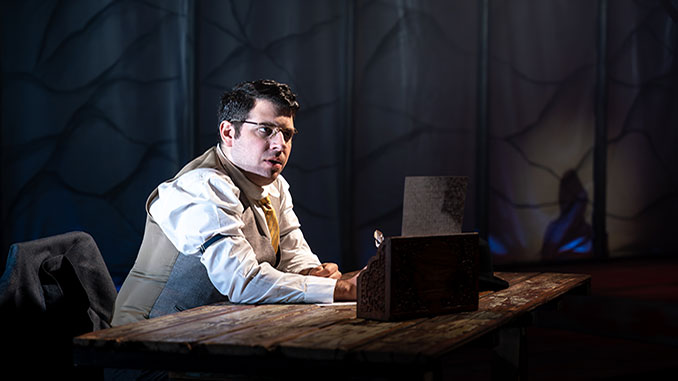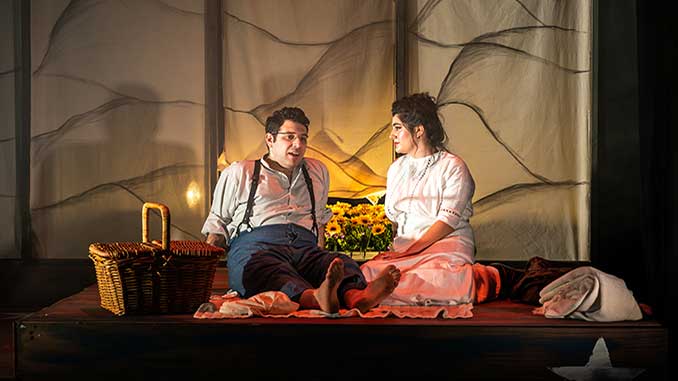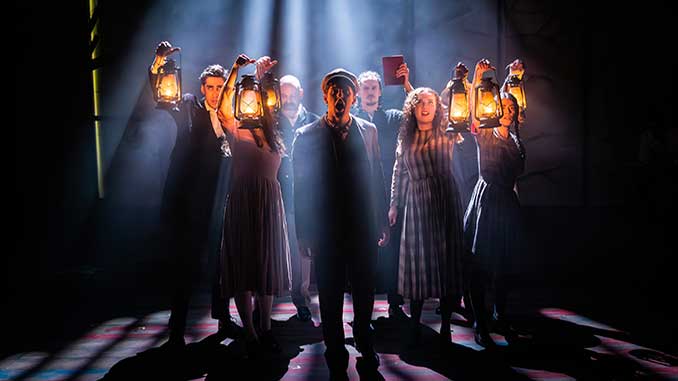 That Jason Robert Brown’s Parade has managed to maintain its relevance since its premiere in 1998 is both a terrifying indictment of our times and a testament to the show’s quality.
That Jason Robert Brown’s Parade has managed to maintain its relevance since its premiere in 1998 is both a terrifying indictment of our times and a testament to the show’s quality.
In the style of Sondheim – who rejected Hal Prince’s offer to compose the music for it – Parade is a show that uses the spectacle of musical theatre to examine prejudice, mob mentality and media misinformation. That the show manages to avoid slipping into mawkish showiness is impressive, and part of its enduring power.
Moments of high theatricality are in service of the book’s interest in its fallible characters, and the complexities of their (in)humanity thrum beneath the surface of every number; whether bombastic showstopper or solo ballad.
In two acts the show tells the story of Leo Frank, a Jewish man wrongfully convicted of the murder of a young girl in 1913 and murdered in an act of anti-Semitic violence not soon after he was commuted. It’s a tragic moment in America’s history that spurred the formation of the Anti-Defamation League and the Klu Klux Klan.
And this year, opening night of Parade’s first revival on Broadway since it premiered was dogged by neo-Nazi protests. It comes to Chapel off Chapel six years after it was last staged in Melbourne, and three months after similar scenes of neo-Nazi salutes appeared on the steps of Parliament House.
The relevance of this show cannot be denied. It is particularly tragic, then, to see this production from Soundworks struggle to marry the topical importance of its content with any clear vision. Despite its talented cast, leaden directorial choices and under baked design elements compromise the poignancy of the show’s character-driven approach to theatrical spectacle.
 The performers assembled here are impeccable. As Leo, Aaron Robuck acts through every song with heart-breaking earnestness and believability. His butter-smooth tone and tight vibrato (not too far off the current Broadway Leo, Ben Platt) betray an endearing sensitivity that belies Leo’s biting wit and occasional thorniness.
The performers assembled here are impeccable. As Leo, Aaron Robuck acts through every song with heart-breaking earnestness and believability. His butter-smooth tone and tight vibrato (not too far off the current Broadway Leo, Ben Platt) betray an endearing sensitivity that belies Leo’s biting wit and occasional thorniness.
Beside him, Montana Sharp shines as Lucille. Her soaring top notes and confident restraint offer an affecting portrait of the capable figure. Though there is little chemistry between the pair, their individual numbers are enough to anchor the show.
Of the rest of the cast, Guillaume Gentil and Mike Gardiner are stand outs. Gentil’s rendition of Blues: Feel the Rain Fall in Act Two was a show-stopping highlight, while his tongue-in-cheek wit and comedic chops brought a much-needed levity to ensemble scenes.
Gardiner’s deep bass was at once authoritative and comforting, a duality he used to nefarious effect as the Judge and the Old soldier, and to add warm Southern hospitality to his performance as the prison guard.
Itunu Akin Ojelabi’s vocals soared powerfully during her rendition of Minola McKnight’s testimony and Nic Davey-Greene’s Governor John Slaton had charisma and charm in spades, though his singing voice was overpowered by the music.
In fact, there are issues with sound mixing across the board, with more than a few voices muted by the ten-strong band. But it’s a strong cast overall, and choral numbers lift the roof off the place )directed tightly by Benjamin Samuel).
Attempts to innovate the pared down design that has become de rigeur since Parade’s West End staging in 2006 are confused. Harry Gill’s set design has a whisper of the Southern Gothic about it, with its dark ochre panelling and shadowy negative spaces.
But the rolling hills painted on large canvas strips at the back of the stage are an odd addition. Seemingly intended to represent the show’s opening refrain – the ‘green hills of Georgia’ – it is an unhelpfully busy backdrop for such a sparse set and its conceptual relevance is thin at best.
Likewise, the wooden tree – another staple of any Parade production – that frames the stage is impressive in scale but far too fragmented to contribute much after its initially impressive reveal.
 Direction by Mark Taylor unfortunately lacks cohesion. At various points throughout the production, Georgian characters draw on the stage with brown chalk. Prison bars, a door, and an ominous circle are penned in various choreographed flourishes.
Direction by Mark Taylor unfortunately lacks cohesion. At various points throughout the production, Georgian characters draw on the stage with brown chalk. Prison bars, a door, and an ominous circle are penned in various choreographed flourishes.
It’s a conceit designed to complement the script’s interest in mob-rule, it seems. But it’s both uneven in its execution and less dynamic than the exaggerated drama with which it is played seems to believe. Transitions during the first act move with a breakneck speed that both curtail any opportunity for applause, and limit the possibility of sitting with – and so better understanding – these anachronistic choices.
Across the board, there’s a near-dogged opposition to stillness and restraint. Slow-motion choreography pulls focus during one of Leo’s subtly introverted numbers, while multi-coloured lighting (and a near-unbearable overuse of bright flashes from overhead lights) prove a frustrating obstacle to our immersion into the richly drawn world of Uhry’s book and the complex characters that inhabit it.
Too often characters turn explicitly to the audience in a bid to emphasise significant moments in each scene. During Leo’s trial, this audience interaction is enlivening, but outside of this framework it reads as self-insistent; overstating the drama of moments in Uhry’s script that favour subtlety. Uhry’s electrifying restraint made Parade a daring departure from – or innovation of – musical spectacle in the first place.
There is room for spectacle – a final projected collage of archival photographs in this production was a beautiful touch – but too many choices here seem to compromise our ability to connect with these characters; over-stating what we should be taking away from their stories with conceits that obscure the source material that is more than capable of showing us.
In the programme notes for the show, Taylor applauds Soundworks ambition for staging Parade in Australia’s risk-adverse arts industry. I’m not as cynical as him, nor as accepting of his attempt to paint Parade as a box-office underdog or darling of the avant-garde.
Recent local productions like YENTL, Once and even the recent Bloom show audiences are not merely ‘craving more diverse and daring pieces of musical theatre’ but that companies are responding to their calls.
Still, I agree that the independent company and its stellar cast should be applauded. I just wonder if more time could have been spent clarifying a vision for the show in the programme notes, rather than simply insisting on its importance.
Parade
Chapel Off Chapel, 12 Little Chapel Street, Prahran
Performance: Friday 28 July 2023
Season continues to 6 August 2023
Bookings: www.chapeloffchapel.com.au
For more information, visit: www.parademusicalmelbourne.com.au for details.
Image: Aaron Robuck as Leo Frank – photo by Matthew Chen | Aaron Robuck as Leo Frank and Montana Sharp as Lucille – photo by Matthew Chen | The Cast of Parade – photo by Matthew Chen
Review: Guy Webster
